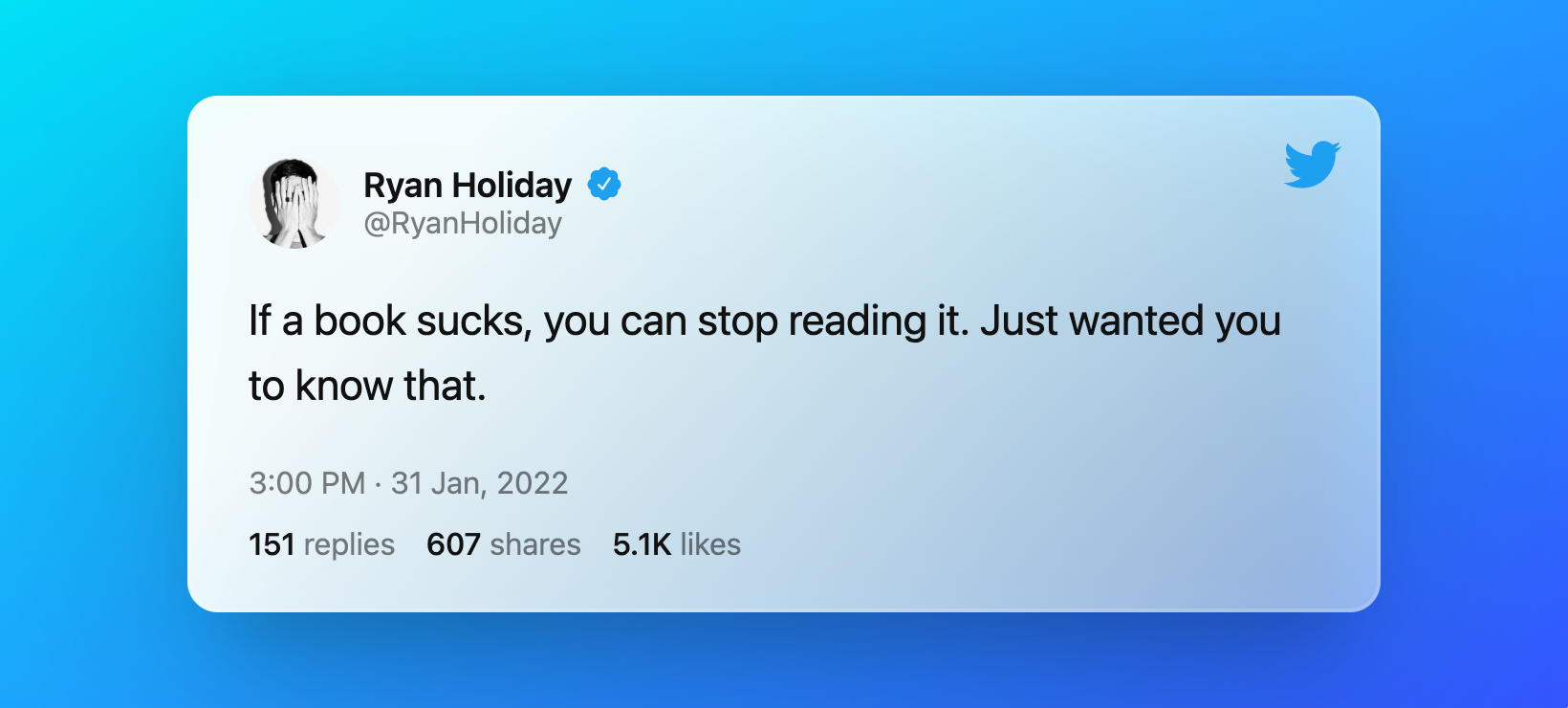How to easily read 50+ books a year: 10 tips to read more
Reading more can change your life. Here's where to start.

I've read a book a week for 15 years. That doesn't include the thousands of articles, essays, and social posts I consume annually.
- I'm not a super-fast reader.
- I don't spend 12 hours a day reading (more like 10% of that).
- I never feel like I don't know what to read next.
Seriously, I'm not some book nerd superhero (although, how cool would that be!). There are simple changes any person can make to read more, and I'd like to share my best ones with you in this article.
Below are ten tips to help you make reading a more natural part of your daily routine so that you can finally finish the books on your list, get lost in great stories, learn new ideas, and become a well-read leader.
Tip #1: Quit bad books

Nothing stops a reading habit in its tracks like a bad book.
A book can be bad for a few reasons. Sometimes they're poorly written, or not well-organized. Other times, the book just doesn't interest you.
Thinking a book is bad doesn't mean you're judgemental or a bad reader. There are, quite literally, dozens of great books I can't stand reading. I've easily quit more than a hundred books over the last few years for exactly the reasons listed above because moving on means I get a new opportunity to find something I love.
If you're a few pages or chapters in and realize it isn't for you, it's okay to put the book down and find what's next.
Tip #2: Finishing a book is optional
The first time I heard this idea, I pushed back. What do you mean you don't need to finish a book... of course you do!
Eventually, I came to understand that I wanted to read more because I wanted to learn, grow, and better my life as a result. Checking off that I had officially finished a book was nice, but not the true goal.
Even good books can be repetitive at times or fluffed in order to hit their publisher-required page counts. So why should we have to wade through everything? You're not getting graded and no one, but you, is keeping score.
This works a little differently for fiction books, seeing as you probably want to know how the story ends. But in the same way, you're allowed to read spoilers and summaries.
Tip #3: Choose easy goals
One of my personal sayings is: easy things get done but difficult things get delayed. So, if you want to make a change in your life, make it as simple as humanly possible.
For reading more, that means reducing the scope of what you want to accomplish. Here's how James Clear describes small habit building.
You have to start with a version of the habit that is incredibly easy for you. It must be so easy that you can’t say no to doing it and so easy that it is not difficult at all in the beginning. — James Clear
Here's how I would start a new reading habit:
- Aim to complete just one page of a book per day.
- Once you finish that first page, you'll likely keep reading. But there's no pressure to do so.
- After one week of successfully reading at least a page a day, increase your goal by 1-3 pages.
- Week by week, continue increasing your goal as you build the habit until you find your limits.
For me, the idea of needing to read 50 pages a day feels intimidating. That's why my goal is only 20 pages or 20 minutes per day. Most days, I'll end up reading more than that, but without the pressure of feeling like I have to.
How long does it take to read a nonfiction book?
On average, a nonfiction book is around 250 pages. By reading just 20 minutes a day, the average person can finish a book that size in 1.5 weeks.
How long does it take to read a fiction book?
On average, a fiction book is around 400 pages. By reading just 20 minutes a day, the average person can finish a book that size in 3 weeks.
Tip #4: Schedule a reading routine
Every good habit needs to be supported by its environment.
When aiming to read more, pick a time of day when distractions are limited. Also, find a place, inside or outside of your home, that can become your reading escape.
When I worked an office job, I would go to my car every day for lunch so that I could spend my hour reading uninterrupted. For you, it might be sitting in your favorite chair before the rest of your family wakes up in the morning. Or carving out time in the evening to read in bed.
One counterintuitive bit of advice I have is if you're unable to read at the same time every day (because of family, or work, or otherwise), do your best to keep the location consistent. This has done wonders for me because every time I sit in my reading spot, I don't want to do anything else but pick up a good book.
My environment trained my brain, and now my brain supports my habit.
Tip #5: Know your reason for reading
One of the most common tips you hear is to choose interesting books.
It's great advice, but it only covers the surface. I want you to go one step deeper and identify why certain books are interesting and others aren't.
Is there a goal your pursuing that this book will help you achieve? Do you admire the author? Is it self-care? Do you want to write a book like this one day?
Knowing the why beneath your habit will help you prioritize reading. For me, most of my reading falls into three categories:
- To become a better husband and person.
- To become better at my job.
- To make better financial and business decisions.
Tip #6: Any medium (audio, physical, digital) counts
There are die-hard book lovers who believe anything apart from a physical book just doesn't count. Well, I disagree.
Reading is meant to be enjoyed, and just because we have more options available than readers did 100 years ago, that doesn't make any of them less worthwhile.
Audiobooks are great if you want to adopt a reading habit that blends into an already busy schedule: listen while driving, washing dishes, working out at the gym, or anywhere.
Ebooks are best for people without the space or budget to acquire physical books. They're also perfect for frequent travelers and late-night bookworms (Kindle's dark mode is a lifesaver).
Physical books are excellent if you like to mark up your books with notes and highlights and find yourself revisiting the same titles often.
My personal library is made up of all three. I use Audible so that I always have an audiobook to listen to during household chores. I use my Kindle Paperwhite for fiction books since they tend to be very large and I do most of my fun reading in bed. The rest of my library consists of physical books so that I can write all over them and revisit them easily for my work as a writer.
Choose whichever you prefer and stick with it!
Tip #7: Always have a book available
This tip ties in with the previous one. If every time you want to read, you find yourself scanning through Amazon or a library app — that's going to slow you down and keep you from developing a consistent habit.
Try to always keep a few unread books within reach, whether on your shelf, e-reader, or phone (the Kindle and Audible apps are excellent, as are Overdrive and Libby for libraries).
Personally, I always keep 2-3 new books in each format available. That way, I have options and can choose what's best depending on where my head's at or what my current goals are.
Plus, it's a perfect reason to splurge on new ones! (Here's a few books I recommend.)
Tip #8: Get accountable to other readers
Accountability is the foundation of goals that last.
That's why people who join communities to lose weight, learn a new skill, or make more money outperform those who go at it alone. Accountability is a multiplier. It supercharges what's possible.
The same is true when it comes to reading. If your goal is to read more books this year, find other people who are after the same objective.
- Find local book clubs.
- Join online groups that talk about your favorite genres or authors.
- Commit to sharing your reading progress on social media.
Last year, my wife and I stumbled upon a book club at a dog park. It turns out, a dozen of the other pet owners met monthly to read dog-related books. We joined, and now the accountability has introduced us to a host of titles we probably never would have discovered on our own.
This tip might require some creative detective work to find the right group(s) for you, but the effort will be worth it.
Tip #9: Non-books count too
When most people talk about their reading goals, they do so in terms of how many books they want to read. But there are many more things to read than books.
Magazines, scripts, newspapers, digital newsletters, poetry, letters... The list is endless.
If you want to read more, but find most books aren't your thing, I suggest subscribing to a magazine (like The Atlantic) or a newspaper (like The New York Times). Both examples employ amazing writers that produce content you can read in 10 minutes or less.
Another non-book example is to look for curated article lists. One of my roles at Ghost is to curate a Staff Picks collection from the different writers who use the platform. Curated lists are an excellent way to discover writers, sources, blogs, and newsletters that are up-and-coming.
How I Learned to Not Defer My Lifehttps://t.co/MXoy5sqJOa
— Ghost: Staff Picks (@GhostStaffPicks) November 18, 2021
Plus, non-book items are often very cost-effective. You can subscribe to a year's worth of magazines, or to a huge collection of articles by an individual, for about the price of a single hardcover book.
Tip #10: Start a blog
Want to know what kickstarted my reading habit all those years ago? Starting a blog like this one.
During the week, I would work my way through a book so that on the weekend, I could turn my notes and thoughts into a blog post. What began as a fun exercise blossomed into a career I could have never imagined with over a dozen published books, the opportunity to work with amazing companies, and hundreds of thousands of readers engaging with my words.
If this sounds like something for you, I recommend using the same tool I use to build your blog: Ghost.
Reading made easy
Whether you want to read a couple more books every year, or multiple books per week, the ten tips covered in this article will help you get there. Here they are once again.
- Quit bad books.
- Finishing a book is optional.
- Choose easy goals.
- Schedule a reading routine.
- Know your reason for reading.
- Any medium counts.
- Always have a book available.
- Get accountability.
- Remember, non-books count too.
- Start a blog to read more!
If one of the reasons you want to read more is to become a better writer, subscribe below for more tips and tools aimed at helping you turn those writing dreams into a reality.
